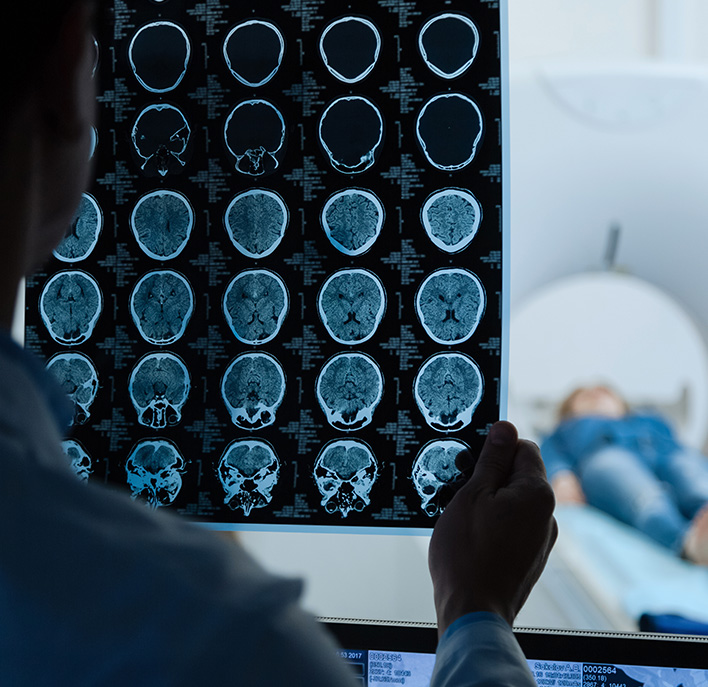
San Francisco Traumatic Brain Injury (TBI) Lawyer
Premier Personal Injury Representation
Traumatic brain injuries (TBI) are among the most catastrophic of injuries that can affect anyone, often from an unexpected or abrupt accident. The consequences of a single TBI can last a lifetime. To begin the path to full recovery after such a severe injury, you will need the help of a particular set of medical professionals and experienced lawyers who are highly familiar with these complex and sensitive cases.
Our San Francisco brain injury attorneys at Rouda Feder Tietjen & McGuinn can be the ones to take your case and pursue justice on your behalf. If you would like to know more about services and our history of success, call (415) 940-7176 or schedule a free consultation today.
Types of Brain Injuries
There are generally three types of traumatic brain injuries. The first type is a mild traumatic brain injury (mTBI). This is usually known as a concussion, and is caused by a blow to the head. Mild traumatic brain injuries typically require rest, pain medication, and restricted activities during recovery.
The second type is a moderate traumatic brain injury. This involves a loss of consciousness for 20 minutes up to 6 hours. It also involves a Glasgow Coma Scale rating of 9 to 12. This is a more severe injury than a mild traumatic brain injury, and requires more extensive medical care.
The third type is called a severe traumatic brain injury. It includes a loss of consciousness for longer than 6 hours, as well as a Glasgow Coma Scale rating of 3 to 8. This is the most serious type of brain injury.
Common Causes of Traumatic Brain Injuries
The accidents or incidents that lead to a TBI are usually preventable. Human error, negligence, and actions of wrongdoing or maliciousness can be attributed to a sizable percentage of traumatic brain injury incidents. According to the Center for Disease Control and Prevention, 40.5% of TBI cases result from slipping and falling, and another 14.3% are the direct result of a car accident. This type of injury can range from mild to severe, though every brain injury should be treated seriously, no matter how minor it might seem.
Other causes of traumatic brain injuries include:
- Unintentional blunt force trauma
- Medical malpractice
- Dangerous drugs
- Assault and violence
Symptoms of Traumatic Brain Injury
Brain injuries are a silent epidemic that affect an estimated 1.7 million people every year, according to the CDC. People who have brain injuries often do not know they are affected, as symptoms usually develop slowly over time. If left untreated, serious and permanent damage can occur to one’s neurological symptom.
Symptoms of a traumatic brain injury fall into four broad categories:
- Physical symptoms. Victims of traumatic brain injuries will most likely experience a variety of physical symptoms. These include headaches, dizziness, seizures, and fatigue. Partial paralysis, appetite changes, insomnia, and other physical disorders can also occur after a traumatic brain injury. More severe TBIs may result in coma, chronic pain, and other physical symptoms. Treatment of these symptoms generally has the goal of reducing pain and helping the patient recover as comfortably as possible.
- Cognitive symptoms. Because traumatic brain injuries affect the brain, cognitive abilities may be impaired. Patients may suffer from confusion, impulsiveness, and a slow information processing time. Furthermore, TBI patients may experience memory loss (called amnesia), as well as difficulty processing language. Much is still unknown about the cognitive impact of TBIs, but treatment often involves various therapies to help the patient maintain and strengthen cognitive functions.
- Social/behavioral symptoms. Traumatic brain injuries can also affect a person’s emotional, social, and behavioral patterns. For example, a typically quiet and mellow person may become angry and easily irritable after suffering a TBI. Others may suffer from depression, anxiety, lack of awareness or motivation, disinhibition (lack of self-control or restraint), and aggression. A person’s behavior and emotions may change significantly, and these symptoms may be temporary or permanent.
- Sensory symptoms. In addition to physical, cognitive, and social/behavioral symptoms, TBI patients may experience sensory symptoms. Blurred vision, blindness, or involuntary eye movements commonly affect a patient’s sense of sight. Furthermore, tinnitus (ringing in the ears), sensitivity to noise, and hearing loss may result from a TBI. Patients may also suffer a lost sense of taste and smell, and have difficulty interpreting touch sensations like temperature and texture.
Mild brain injuries might result in headaches, neck pain, ringing in ears, dizziness, and fatigue. To be certain that you have not sustained any serious damage, visit your doctor or seek emergency care. Doctors can use a neurological exam and various imaging tests to determine the severity of your injury. When treated in its early stages, it may be possible to stabilize your condition and prevent a brain injury from getting worse.
What Are the Consequences of a TBI?
Medical practitioners may find it difficult to predict just how severely a traumatic brain injury will affect someone due to the still-developing sciences behind understanding brain function. It is critical that you seek professional medical assistance whenever you are wounded, especially when it could be in a way that affects your brain. A minor injury now could be indicative of severe conditions in the future.
A brain injury may result in the following consequences:
- Amnesia and memory loss
- Loss of motor or speech functions
- Falling into a coma
- Insomnia, anxiety, and restlessness
- Chronic headaches or migraines
- Death

Real Stories. Real People.
See what our clients have to say
-
A knowledgeable and compassionate team, the lawyers at Rouda Feder Tietjen & McGuinn are a true pleasure. And, most importantly, they deliver results; we got the outcome we were after and felt cared for every step of the way. With this team behind you,- Lisa
-
- Client of RFTM
I had the pleasure of working with June Bashant, and she truly exceeded all expectations. After my devastating accident, June and her team worked tirelessly on my behalf, leaving no stone unturned to secure the best possible outcome. She is a powerhouse of tenacity and determination, relentlessly pursuing justice with an innovative, out-of-the-box approach that led to life-changing results, including care that will last a lifetime.
From the very start, June’s communication skills were exceptional—she kept me well-informed and supported throughout the entire process. Her professionalism was evident, but it was her genuine compassion and care that made me feel like a priority. She wasn’t just an attorney; she was a fierce advocate, fighting on my behalf every step of the way.
June’s strategic mindset, intelligence, and sheer determination set her apart. She far exceeded my expectations in every area and had a remarkable network of professionals to help with every facet of my case. Her personal touch, combined with her incredible expertise, made me feel confident that I had the best team behind me.
If you’re facing a medical malpractice or personal injury case, June Bashant is the attorney you want in your corner. She is a force to be reckoned with in the legal world—unmatched in her dedication, skill, and drive. Her reputation for delivering powerful, life-altering results speaks for itself. I couldn’t have asked for a more unstoppable attorney.
-
Thank you Sir once again! This time for helping my son Leon McDermand attain the services of June Bashant, who he has himself said many times, that she did a magnificent job for him. This is the third family member, including myself, that you and RFTM have helped. Thank you once again Tim, and please thank June and Robert, who helped my Daughter Elena.- Robert
-
“I cannot thank you enough for the pure excellence.”- Michelle
-
“I am very grateful for all the hard work all the staff did. GREAT STAFF!”- Guadalupe Hernandez
-
“I valued the clear communication, prompt replies, and frank interaction.”- Jackie Q.
-
“They work tirelessly to uncover the evidence necessary to obtain the very best result for the injured people they represent.”- Heidi Taylor, Law Offices of Heidi Taylor
-
“They approach each case with creativity and care.”- Michael J Ney, McNamara, Ney, Beatty, Slattery, Borges & Brothers LLP
